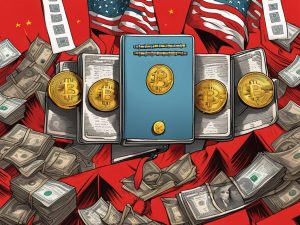Breaking News: Binance Executives Detained in Nigeria Amidst Crypto Crackdown 🚨
Nigerian authorities have made a significant move to crack down on naira speculation by detaining two senior executives at Binance, one of the world’s largest cryptocurrency exchanges. This comes after the Nigerian government imposed a ban on multiple crypto exchanges and ordered telecom and internet service providers to restrict access to these platforms.
The Arrest and Seized Passports 📛
- The Office of the National Security Adviser detained the two senior executives upon their arrival in Nigeria.
- The names of the detained executives have not been disclosed.
- Sources familiar with the situation revealed that their passports were seized.
Nigeria’s Focus on Cryptocurrency Websites 🎯
Nigerian authorities have turned their attention to cryptocurrency websites due to the rapid devaluation of the naira, which has contributed to inflation reaching its highest level in nearly three decades at almost 30%. The government aims to safeguard against further depreciation of the national currency by restricting access to various crypto exchanges, including Binance, Coinbase, and Kraken.
Governor’s Concerns Over Fund Flows 💰
Olayemi Cardoso, Nigeria’s central bank governor, expressed concerns about fund flows through crypto exchanges during a recent press conference. He specifically mentioned Binance Nigeria and highlighted worries over significant sums totaling $26 billion passing through the platform in 2023. The government is unable to adequately identify the sources of these funds, raising further suspicions.
Request for User Information 👥
Nigerian authorities have reportedly requested a list of Binance’s Nigerian users who joined the platform since its launch. It is unclear whether this request is part of negotiations to secure the release of the detained executives.
Binance’s Commitment to Compliance 🤝
Earlier this month, Binance took steps to demonstrate its commitment to collaboration with local authorities in Nigeria. The exchange imposed a limit on the selling price of Tether (USDT) on its peer-to-peer platform in the country. In a blog announcement to Nigerian users, Binance stated that it is working hand in hand with local authorities, lawmakers, and regulators to ensure compliance.
Hot Take: Nigeria Takes a Tough Stance on Cryptocurrency ⚖️
The detention of Binance executives in Nigeria marks a significant development in the country’s crackdown on cryptocurrency. The government’s actions reflect its concerns about the devaluation of the naira and its impact on inflation. While these measures aim to protect the national currency, they also raise questions about the future of cryptocurrency in Nigeria.
As a crypto reader, you may be wondering about the implications of this event:
1. Impact on Crypto Adoption 📉
- The arrest of Binance executives could discourage crypto adoption in Nigeria as it creates uncertainty and fear among potential investors.
- Nigerian traders may seek alternative platforms or turn to decentralized exchanges to bypass restrictions imposed by the government.
2. Regulatory Landscape in Nigeria 🌍
- The detention of Binance executives highlights the Nigerian government’s determination to tighten regulations on cryptocurrency.
- This incident may prompt other countries to reconsider their own regulatory approaches to digital assets.
3. Potential Negotiations and Resolutions 🔐
- The request for user information from Binance suggests that negotiations may be underway to secure the release of the detained executives.
- It remains to be seen whether Binance will comply with this request and how it could affect its operations in Nigeria.
In conclusion, the detention of Binance executives in Nigeria underscores the government’s efforts to control naira speculation and protect the national currency. This event has broader implications for crypto adoption and regulation not only in Nigeria but also in other countries. As the situation unfolds, it will be crucial to monitor any developments that may impact the future of cryptocurrency in Nigeria.





 By
By
 By
By
 By
By
 By
By
 By
By
 By
By